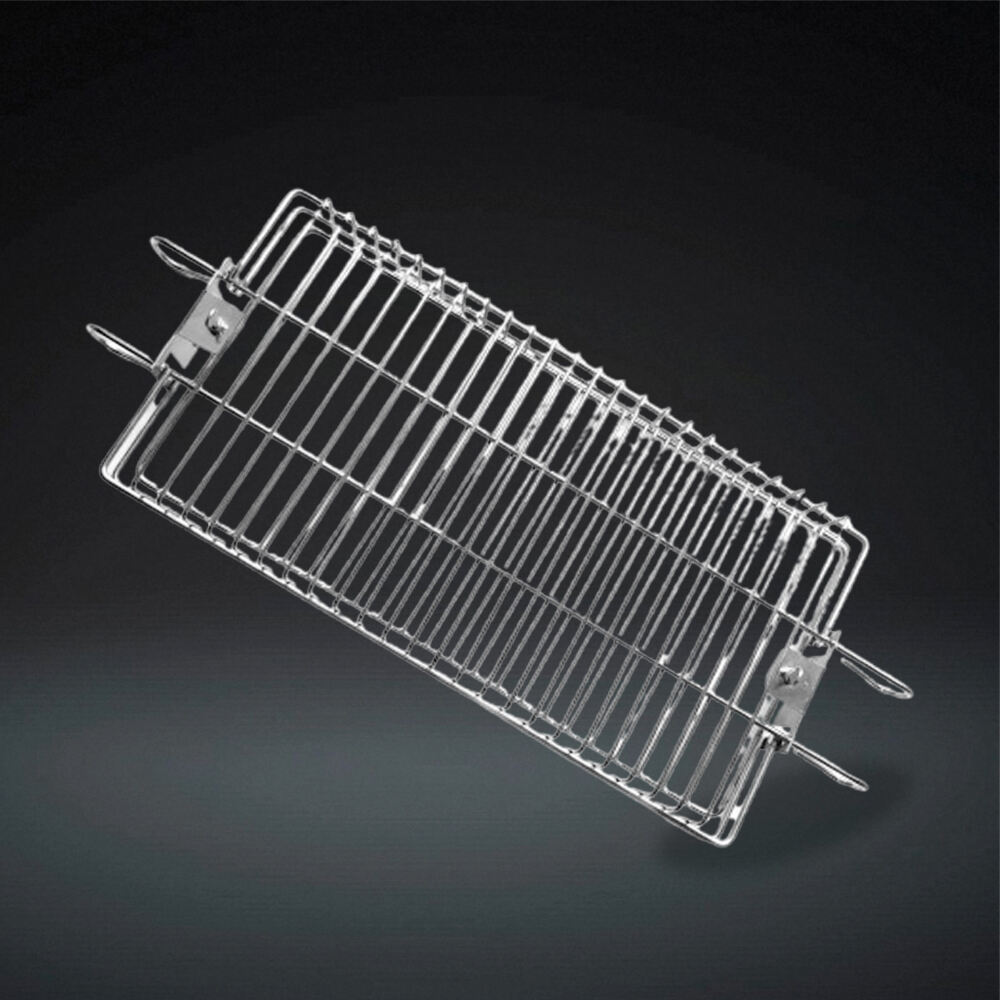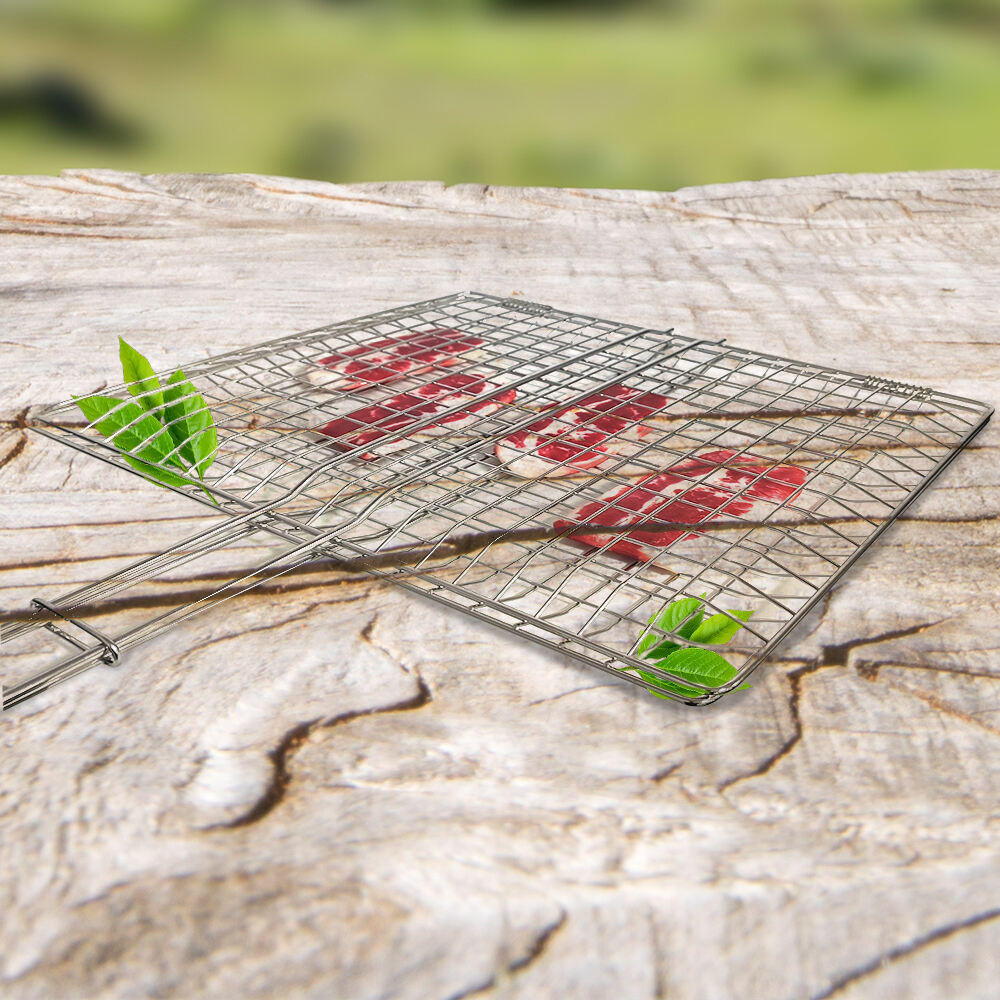Key Benefits of Using a BBQ Basket for Vegetables
Prevents Food Loss Through Grill Grates
Utilizing a BBQ basket to grill vegetables significantly reduces food loss, especially when dealing with smaller pieces prone to slipping through the grill grates. With traditional grilling methods, vegetables like sliced bell peppers or thin asparagus often fall into the fire, leading to unnecessary waste. But, by using a BBQ basket, you can cut food waste by up to 30%, as revealed in recent grilling studies. These baskets are cleverly designed with mesh or perforated surfaces that allow heat and smoke to circulate while ensuring no veggies are lost to the flames. Whether you're grilling a delicate vegetable or something heartier, the basket keeps everything secure.
Ensures Even Heat Distribution
One standout advantage of a BBQ basket is its ability to ensure even heat distribution, which plays a crucial role in achieving perfectly grilled vegetables. The basket's design fosters better airflow, allowing the heat to surround each piece uniformly and enhance flavors through proper caramelization. Uneven cooking is a common issue that leads to undercooked or overcooked segments, as research on grilling suggests. By promoting even heat, a BBQ basket makes sure that each bite delivers consistent taste and texture, creating a uniformly delightful experience for anyone enjoying your grilled veggies.
Simplifies Flipping and Stirring
A BBQ basket's true convenience lies in how it simplifies flipping and stirring while grilling vegetables. Instead of wrestling with tongs and risking burns, you can easily shake or turn the basket, keeping your veggies intact and ensuring even cooking. This feature especially benefits grilled vegetable enthusiasts who appreciate easy handling without compromising on texture or doneness. Grilling experts often highlight that the ease of flipping and stirring offered by BBQ baskets contributes to a superior cooking experience, allowing for perfect char and flavor infusion without the hassle.
Ideal for Delicate or Small Vegetables
BBQ baskets are an excellent choice for cooking delicate or small vegetables, which often pose a challenge due to their size and tenderness. Thinly sliced zucchini or slender asparagus spear are perfect candidates for the basket, preventing them from falling apart or burning. Many cooking experts suggest using a basket to preserve the texture and moisture of these veggies during grilling. Furthermore, its protective design allows delicate vegetables to develop grill marks without direct exposure to intense heat that might damage their delicate nature. This functionality ensures you enjoy perfectly grilled veggies every time.
Preparing Vegetables for BBQ Basket Grilling
Choosing the Right Vegetable Cuts
Selecting the right vegetable cuts is pivotal for optimizing cooking time and enhancing flavor. Experts recommend cube-shaped cuts, especially for denser vegetables like squash and potatoes, which cook faster and absorb seasonings more effectively. Additionally, thin slices increase surface area exposure, permitting better marinade penetration and flavor absorption. The goal is to strike a balance between size and thickness to ensure even grilling and delightful taste.
Uniform Sizing for Consistent Cooking
Ensuring uniform sizing in vegetable pieces facilitates consistent cooking and prevents uneven results where some pieces might burn while others remain raw. Cooking enthusiasts advise cutting vegetables to roughly 1-inch pieces; this uniformity not only aids in cooking but also enhances the visual appeal of the finished dish. Consistency in sizing helps achieve a professional appearance, akin to restaurant-quality presentations.
Proper Oiling Techniques to Prevent Burning
Proper oiling techniques play a critical role in retaining moisture and preventing burning on the grill. Applying an even coat of oil can enhance flavor and minimize sticking to the BBQ basket. Experts often suggest using oils with high smoke points, like avocado or grapeseed oil, to reduce the risk of burning. It's essential to know the right amount of oil to apply; typically, 1-2 tablespoons are recommended according to the volume of vegetables being grilled.
Marinating vs. Dry Seasoning Strategies
Understanding the balance between marinating and dry seasoning significantly enhances the flavor profile of grilled vegetables. Marinades should be applied at least 30 minutes before grilling to ensure proper absorption, whereas dry seasoning can be applied just before cooking for immediate flavor impact. Balancing acidity and spice, as noted by professional chefs and grilling aficionados, can create an impressive flavor profile that delights the senses and elevates your BBQ experience.
Mastering BBQ Basket Setup and Temperature Control
Preheating the Basket to Avoid Sticking
To ensure that vegetables start cooking immediately and minimize the chance of sticking, I always preheat my BBQ basket. Grilling professionals recommend heating the basket for about 10 minutes at high temperature before adding food. This preheating step not only prevents sticking but also helps create those attractive grill marks on vegetables, enhancing both the flavor and presentation.
Direct vs. Indirect Heat Applications
Understanding the difference between direct and indirect heating is pivotal for optimal vegetable grilling. Direct heat is ideal for quick-cooking vegetables like zucchini and asparagus, giving them a nice char while maintaining their crispness. In contrast, indirect heat works better for thicker, denser options like potatoes and carrots, allowing them to cook thoroughly without burning. By employing both methods, I can create a mixed vegetable dish that progresses smoothly through various textures and flavors.
Adjusting Heat for Different Vegetable Types
Different vegetables require varying levels of heat for grilling, and managing this is crucial for perfect outcomes. For example, hearty vegetables like carrots need longer cooking times with lower heat settings to become tender without burning. Additionally, heavier vegetables benefit from prolonged exposure to smoke, which enhances their flavor profile. I keep an eye on the temperature, regularly adjusting it to safeguard more sensitive vegetables from burning, ensuring everything comes out perfectly cooked.
Using Foil or Lids for Steaming Thick Vegetables
Using aluminum foil or lids can trap steam, essential for cooking thick and dense vegetables. This method is particularly effective for larger vegetable pieces, enhancing moisture retention during grilling. By employing this technique, I ensure even cooking, preventing outer burns while the insides are undercooked. Some professional tips include wrapping vegetables in foil before grilling, which is a simple yet effective strategy for achieving perfect grilled veggies with minimal fuss and maximum flavor.
Optimal Grilling Techniques and Timing
Shaking and Flipping Frequency Guidelines
When grilling vegetables, the frequency of shaking and flipping is pivotal to achieving optimal results. To allow for proper caramelization, I find that a gentle shake or flip every 3-5 minutes is ideal. This minimal interference helps vegetables develop a beautiful crust while ensuring even cooking throughout. A significant benefit of adhering to this schedule is the reduction in the loss of small vegetables through the BBQ basket grates, courtesy of less frequent handling. Patience is key; over-manipulating the contents of the basket can cause the vegetables to lose their juices and compromise their natural flavors, leading to a less satisfying dish.
Achieving Perfect Char Without Overcooking
A perfect char on vegetables requires me to balance high temperature and precise timing. Typically, the grilling duration hovers between 8-12 minutes depending on the specific vegetable. To ensure that the char does not come at the cost of texture, using a thermometer proves invaluable in determining the right degree of doneness without cutting into the vegetables. Experienced cooking bloggers heavily emphasize the importance of visual indicators, like a rich color change, which hints that the vegetables have reached that sought-after char. Through these techniques, I can consistently deliver vegetables that are both pleasing to the eye and palate.
Grill Times for Common Vegetables
Knowing the exact grill times for various vegetables is fundamental to achieving the desired results. For instance, bell peppers generally require about 10-12 minutes on the grill, whereas zucchini may cook perfectly in around 8 minutes. Overcooking not only diminishes taste but also compromises crucial nutrients; beyond 10 minutes at high heat, certain nutrients begin to degrade. Therefore, keeping track of these grill durations aids significantly in planning and executing a successful multi-vegetable grilling session. By referencing documented grill times, I ensure each vegetable reaches its peak flavor without sacrificing its health benefits.

Multi-Vegetable Grilling Strategies
Grilling multiple vegetables simultaneously in a BBQ basket demands strategic planning to optimize both cooking and flavor. Success lies in adjusting timing according to the size and density of each vegetable. For effective multi-vegetable grilling, I recommend arranging denser vegetables like potatoes at the bottom of the basket, while softer options are placed on top. This layered approach guarantees that while denser vegetables receive more direct heat for longer periods, softer counterparts are spared from overcooking. Organizing in this manner ensures each layer nurtures flavor enhancement, showcasing the strengths of the BBQ basket throughout the grilling process.
Maintenance and Post-Grill Care
Proper Cleaning Methods to Prevent Rust
Maintaining the longevity of your BBQ basket involves diligent cleaning practices to prevent rust. After use, it's crucial to clean the basket with warm soapy water as the first step. However, soaking is often discouraged by experts because it can cause corrosion in metal materials. Instead, thorough scrubbing followed by immediate air drying is recommended. This ensures that moisture, which promotes rust, is evaporated quickly. Proper drying prevents rust formation, preserving the basket's usability and appearance.
Storing Your BBQ Basket for Longevity
The storage environment plays a critical role in the lifespan of a BBQ basket. Keeping the basket in a dry and cool area is essential to prevent rust from moisture and humidity. Additionally, utilizing a protective cover can defend against dust and build-up that may affect its performance. It’s also beneficial to inspect the basket regularly for any signs of damage or wear such as cracks, which could compromise its performance during grilling. Such preventative steps can significantly extend the life of your BBQ basket, ensuring it remains in optimum grilling condition.
Troubleshooting Common Basket Issues
Addressing common BBQ basket issues involves simple yet effective solutions. To prevent food from sticking or uneven cooking, proper preheating of the grill and applying a light coat of oil to the basket can be beneficial. If rust starts to appear, it might be due to inadequate cleaning and drying - quick intervention can restore the basket to usable condition. Identifying and fixing issues early can save money over time by avoiding expensive repairs or replacements, making regular maintenance an economically smart practice.
When to Replace Your Grill Basket
Knowing when to replace your BBQ basket is essential for safety and cooking quality. Signs like excessive rust or warping can detrimentally affect cooking and indicate it's time for a new basket. Regular examination for these signs, as well as for any cracks or weakening, is advisable since such flaws can pose cooking risks. Many users have found replacing their BBQ basket every 2-3 years helps maintain top quality and performance, ensuring they continue to enjoy perfect grilling outcomes.
FAQ
Why should I use a BBQ basket for vegetables?
Using a BBQ basket prevents small vegetables from falling through the grill grates and helps achieve even cooking, enhances flavor, and simplifies flipping and stirring while grilling.
How does a BBQ basket ensure even heat distribution?
The design of the basket promotes better airflow, allowing heat to surround each vegetable piece uniformly for effective cooking and caramelization.
What oil is best for a BBQ basket?
Oils with high smoke points, like avocado or grapeseed oil, are recommended to minimize sticking and prevent burning during grilling.
When is it necessary to replace my BBQ basket?
Replace your BBQ basket when you notice signs of excessive rust, warping, or any structural damage that may compromise safety and cooking quality.

